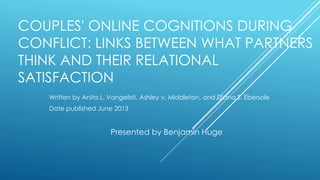
Presentation 1
- 1. COUPLES' ONLINE COGNITIONS DURING CONFLICT: LINKS BETWEEN WHAT PARTNERS THINK AND THEIR RELATIONAL SATISFACTION Written by Anita L. Vangelisti, Ashley v. Middleton, and Diana S. Ebersole Date published June 2013 Presented by Benjamin Huge
- 2. WHO IS ANITA L. VANGELISTI? Ph.D., University of Texas She is interested in interpersonal communication among family members and between romantic partners. Dr. Vangelisti has published articles in journals such as Communication Monographs, Human Communication Research, Journal of Personality and Social Psychology, Personal Relationships, Family Relations, Journal of Adolescent Research, and Journal of Social and Personal Relationships. She has received the Bernard J. Brommel Award for Outstanding Scholarship in Family Communication from the National Communication Association, the New Contribution Award from the International Society for the Study of Personal Relationships, and the Franklin H. Knower Article Award from the National Communication Association.
- 3. HAVE YOU EVER ENGAGED IN A CONFLICT WITH YOUR PARTNER AND FELT DISSATISFIED WITH THE RESULT?
- 4. WHAT WAS THE STUDY? The study was conducted to investigate romantic partners’ cognitions as they discussed a topic of conflict in their relationship. Past research has shown 1. Very few have investigated participants’ cognitions during conflict. 2. Majority of studies have examined partners’ cognitions in broad terms. Examples: Relational enhancing or distress maintaining. 3. More of a focus between individuals’ cognitions and their own satisfaction. Not a partner’s satisfaction.
- 5. THE LITERATURE: COGNITIONS IN CLOSE RELATIONSHIPS The association between relational satisfaction and partner’s cognition. Studies show the differences in those satisfied and dissatisfied Satisfied: tend to attribute their partner’s negative behavior to causes that are external, specific, and unstable (e.g., ‘‘. . . because she had a tough day’’). Dissatisfied: make internal, global, and stable attributions for their partner’s negative behavior (e.g., ‘‘. . . because he is lazy’’) Interdependence theory: The theory suggests not only that people’s cognitions affect their own satisfaction, but also that individuals’ cognitions can affect their partner’s satisfaction and vice versa.
- 6. ASSESSING COGNITIONS IN CLOSE RELATIONSHIPS Most studies have relied on retrospective self-reports or responses to hypothetical situations Reports may be artificially inflated. Video-assisted recall to assess the valence or focus of partners’ cognitions Problem: Different procedures are needed to capture what partners are thinking about during the course of interaction Video-assisted show.. Distressed Partners=Negative Cognitions Satisfied Partners= Positive Cognitions
- 7. THE CURRENT STUDY: RATIONAL Protocol analysis was employed. It has been used in fields such as reading and mathematics to explore the cognitive processes that people engage in as they perform certain tasks. Researchers using this method instruct participants to work on a task and ask them to ‘‘talk aloud’’ the thoughts they have as they work. Meant to build on existing research using video-assisted recall.
- 8. METHOD Romantic partners interact with each other over networked computers and, at the same time, report their cognitions orally. 71 heterosexual romantic couples. 67 analyzed. Participants were 17 to 31 years old. ( M=20.60, median=20.00, SD=2.11) 71.8% were Caucasian, 15.5% were Hispanic, 12.0% were Asian American/pacific Islander, 0.7% identified themselves as “other.” The length of couples’ relationship ranged from six to 90 months (M=37.19, median=32.00, SD=16.22).
- 9. PROCEDURE 1. Couples go into separate rooms and asked “talk aloud” about what they were thinking while they conversed with each other. 2. Given a piece of paper and list 5 issues in areas of disagreement. 3. Complete 3 questionnaires and 2 computer mediated interactions Interactions were on past relationships, money, alcohol. Questionnaires on demographics, on protocol procedures, and Marital Opinion Questionnaire. There were 2 coders.
- 10. TRANSCRIBED DATA This is just one example.
- 11. INTERACTION COGNITION CODING SCHEME ICCS is an inductively derived category system designed to describe the thoughts and feelings that married couples report experiencing during conflict interactions. General Categories are: Emotion Issue Appraisal Person Appraisal Process Uncodable/Off Topic
- 12. RESULTS Participants whose thoughts focused on Dominating the Floor tended to be less satisfied with their relationship. Relationships in which both individuals’ thoughts were low in assertion had higher satisfaction The more partners’ thoughts focused on the analysis of topics, ideas, and opinions under discussion, the higher participants’ relationship satisfaction. Higher # of thoughts denying the problem tended to be less satisfied in the relationship.
- 13. THEIR FINDINGS Majority of thoughts were about self. Analyses found dissatisfied tended to express anger, negative, and critical thoughts. Fits previous research. Satisfied partners are constructive or accommodative. Couples tended to be more satisfied than they were when both partners expressed either a high or a low number of such thoughts. Accessing the thoughts and behavior helps show the way a couple feels about each other.
- 14. Strengths Coding measuring cognition instead of “relationship enhancing” 2 Coders Videotaped Transcribed Protocol Analysis Weaknesses Computer-mediated interactions are not equivalent to face-to-face conversations. Participants may have withheld certain thoughts because of the presence of a researcher. Talked about issues may have been less serious than others. Diversity
- 15. QUESTIONS!